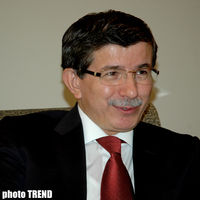ID :
221744
Wed, 01/04/2012 - 13:18
Auther :
Shortlink :
http://m.oananews.org//node/221744
The shortlink copeid
Davutoğlu visits Iran to discuss Syria, Iraq, nuclear standoff

Turkish Foreign Minister Ahmet Davutoglu is traveling to Tehran as part of consultations with his Iranian counterpart they agreed to hold twice a year Today`s Zaman reported.
A statement Turkish Foreign Ministry released on Tuesday said Davutoglu is paying a two-day visit to Tehran on Wednesday to discuss bilateral relations, regional and international developments, unrest in Syria, latest political developments in Iraq and nuclear standoff between the Islamic republic and the West.
The statement recalled that Davutoglu visited Tehran last July and his Iranian counterpart, Ali Akbar Salehi, came to Ankara in October last year as part of the consultations both foreign ministers agreed to hold twice a year.
Davutoglu's visit to Tehran comes exactly a year after the last round of negotiations between Iran and the five permanent members of the UN Security Council plus Germany that was held in İstanbul. The last nuclear talks ended in failure.
Iran said last Saturday that it has proposed a new round of talks on its nuclear program with six world powers that have been trying for years to persuade Tehran to freeze aspects of its atomic work that could provide a possible pathway to weapons production.
The country's top nuclear negotiator, Saeed Jalili, said he has formally called on the United States, Russia, China, Britain, France and Germany to return to negotiations.
Another topic the foreign ministers are scheduled to discuss will be Iraq and the latest developments in the war-torn country. The chaos that followed the 2003 US invasion and toppling of Saddam turned Iraq into a regional bear pit, where Saudi Arabia, Iran, Syria and Turkey backed different sides in a messy struggle that pitted Shi'ites against Sunnis and Arabs against Kurds.
A recent decision by the Shi'ite prime minister, Nouri al-Maliki, to seek the arrest of his Sunni vice president, heavily backed by Turkey, on terrorism charges has pushed Iraq's fragile coalition to the verge of collapse, raising the spectre of renewed civil war - with alarming implications for all its neighbors.
US ally Turkey is among the biggest buyers of Iranian oil and gas. It gets about 30 percent of its oil from neighbor Iran, and Tuprash, Turkey's biggest crude oil importer is a big buyer of Iranian crude.
The United States has armed itself with tough measures targeting financial institutions that deal with Iran's central bank, the main clearinghouse through which OPEC's No. 2 oil exporter deals with clients around the world.
The law, signed by President Barack Obama on Saturday, allows the US to exempt institutions in a country that has significantly reduced its dealings with Iran. Obama may also grant waivers deemed to be in the US national interest or otherwise necessary for energy market stability.
Turkey is bound by UN sanctions against Iran, though it opposed the last round of measures in 2010, and it insists it is not obliged to follow non-UN sanctions.
Iran threatened on Tuesday to take action if the US Navy moves an aircraft carrier into the Gulf, Tehran's most aggressive statement yet after weeks of sabre-rattling as new US and EU financial sanctions take a toll on its economy.





